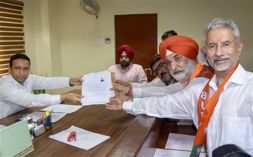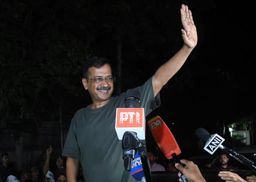
POLITICAL BACKLASH: Punjab is an agrarian state but must support its industries too. State’s responsibility can only be neglected at a political cost which no government can afford.
Bhupinder Singh and Malkit Singh
Bhupinder Singh
Power Sector Expert
Malkit Singh
(co-contributer)
The Centre proposes to amend the Electricity Act-2003. If carried out, the electricity sector shall dilute the role of the state governments in power sector because of a major paradigm shift in its structure and control.
Private sector participation, especially distribution, shall get a big boost, giving the Centre more access and control. Even as the earlier attempt at reforms for encouraging competition did attract private sector participation in electricity distribution only in urban areas. Also, the highest tariffs in the country are in areas where electricity distribution is with private companies, defeating the very purpose of the reforms. Therefore, whether the Centre's intervention to create a larger role for itself shall usher in improvement or not remains a pertinent question. And now, with the introduction of additional 'Supply Licensee' (an agent) in the present electricity distribution system, electricity tariffs are further expected to rise due to increase in overheads.
Historical background
After Independence, generation, transmission and distribution was entrusted to the state public sector by enacting the Electricity Act, 1948. Later on, a framework was created to bring private sector participation by enacting the Electricity Act, 2003. Electricity boards were dismantled and companies were created. However, the results have been far from satisfactory and most electricity companies are staring at high line losses, mounting debts and rising subsidy bills of the state governments.
Cherry-picking consumers
In the present scheme of things, the distribution licensee (PSPCL in Punjab) owns and maintains electricity lines and also procures electricity, which is then supplied to consumers through these lines. Under the new system, the arrangement and procurement of electricity shall be the responsibility of the supply licensee (an agent) instead of distribution licensee. The intent is to procure electricity from the market at lowest rates but the actual ground picture may be quite different. Due to profit motives, the supply licensees, who shall mostly be private players, shall cherry-pick wealthy consumers, leaving the incumbent distribution licensee (who shall also be the supply licensee by default) to serve the poor mostly living in the rural and semi-urban areas. Taking away the profit-making side to benefit the private players and leaving the loss-making side to the public sector distribution company shall have far-reaching and adverse consequences for the general public, especially the weaker sections having less paying capacity.
Also, it is proposed to alter the methodology of payment of subsidies — directly to the consumer's account. The Centre now also wants to be a player in paying subsidy to the consumers. Effectively it means that, the subsidised category of consumers shall be under obligation to clear their electricity bills in the first instance and obtain refunds in their accounts later on. Cross subsidies which are a mechanism for making affluent class of consumers to take care of weaker sections by paying higher tariffs shall be abolished in three years’ time. But, the crucial question is, who bears the loss of revenue? Obviously the state governments, whose subsidy bill shall further shoot up. The surcharge on open access consumers shall go in two years time which shall lead to a big load of consumers moving away from the distribution licensee, further adding to its financial woes. The tariff shall be in the form of ceiling tariff, i.e. the maximum limit of tariff.
The generators shall get relief as the power purchase agreements shall be based on average annual demand to supply 24x7 supply and the distribution companies shall have to absorb the risk of uncertainty due to variations in load growth and prices and the sudden flight of high end consumers. The burden shall ultimately be passed on to the consumers to absorb these losses. The power purchase agreements shall be on formats to be approved by Central Government and violations shall attract heavy penalties at the rate of Rs 1 crore per day. Energy security is the new theme with focus on renewable energy sources to ensure long term sustainable energy reliability. The committees at national, regional and state level shall be established for integrated operation of the system.
States’ concerns
The state governments stand to lose authority to appoint chairperson and members of the powerful regulatory bodies of their respective states. These appointments instead shall be finalised by a selection committee having majority representation from the Centre.
No doubt, many things need to be fixed in electricity sector. But diluting the role of the states is unlikely to yield dividends. Punjab is primarily an agrarian state and needs to support its industries as well. The responsibility of the state towards weaker sections of the society can only be neglected at a political cost which no state government can afford. The amendments to the Act shall create pockets of affluent electricity consumers in a sea of rural, weaker sections, small and medium industries and enterprises. Disappearance of cross subsidies shall put additional burden on the state exchequer. For example, the Government of Punjab shall have additional subsidy burden of Rs 1,600 crore in addition to its present subsidy bill of Rs 8,949 crore.
Appallingly, the present amendments do not suggest any corrective mechanism to high line losses, overburden of debt, etc. Improvements in efficiency parameters through strong internal reforms and hand holding as per targets of UDAY scheme can have much larger and sustainable results. However, internal reforms are painful which governments, managements, employees and their unions shy away from. But, this is the only path, which can ensure equitable and cheaper electricity access across the different strata of society to propel the economic growth of the state.
Electricity is a politically sensitive commodity. The states must exercise due care not to be left out in the new set up being proposed. After all, that is the spirit of federalism.



























